Dan Thompson – Audio Fundamentals for Recording
$1,250.00 Original price was: $1,250.00.$250.00Current price is: $250.00.
Digital Download: You will receive a download link via your order email after successful payment.
Music technology has become integral to the life and work of every musician. Increasingly, all professional musicians and music producers are responsible for and expected to be able to effectively record themselves and others
Audio Fundamentals for Recording
Music technology has become integral to the life and work of every musician. Increasingly, all professional musicians and music producers are responsible for and expected to be able to effectively record themselves and others, navigate MIDI and audio systems, and troubleshoot their own and others’ recording set ups. Audio is at the heart of every sound system, both analog and digital, and a fundamental knowledge and understanding of audio and audio systems is a must.
In Audio Fundamentals for Recording, you will learn to understand and manage both simple and complex sound systems, including recording studios and live sound reinforcement set ups. The ability to properly set up, operate, and manage any sound system effectively depends on a foundational understanding of both acoustical sound and electrical audio signals. This course will provide you with an in-depth look at such sound systems, both analog and digital, from initial acoustic inception, through transduction and electrical manipulation, to power and acoustic reproduction.
The course will take you through the complete audio signal chain, beginning with the acoustic source. You’ll explore audio transducers including microphones and loudspeakers. You’ll then explore basic and advanced signal flow, including analog and digital consoles and digital audio workstations (DAWs), culminating in gain structures, where you’ll learn to trace levels through a complete hybrid studio signal chain, from source and microphone to loudspeaker and headphones. Along the way you’ll learn about basic acoustics and electronics, analog and digital formats and professional conventions, levels and metering, and DAW and console signal flow.
Audio Fundamentals for Recording is geared towards students interested or engaged in recording themselves and/or others and interested in setting up and navigating a recording studio of any size. By the end of the course, you’ll be able to configure and trace a recorded signal through a complete recording studio set up, while optimizing levels and avoiding noise and distortion. You’ll be able to read and understand equipment spec sheets, studio, console, and DAW signal flows, and properly set up a basic recording studio integrating both analog and digital elements and interconnects with attention to proper impedance, interfacing, and clocking. You will have the skills to optimize gain stages and trace levels throughout the system, as well as troubleshoot potential problems. Consider this your twelve-week audio bootcamp!
Upon successful course completion, you will have gained a thorough understanding of both analog and digital audio systems. You will be able to:
- Read as well as generate signal flows of complex audio systems
- Navigate analog and digital audio console, control, and DAW architectures
- Read and understand audio equipment specification sheets
- Trace levels through sound system gain structures
- Use Ohms Law to calculate voltages, current, and power in circuits
- Manage audio levels and impedances in complex sound systems
- Differentiate between and apply different decibel conventions
- Apply professional metering conventions
- Use proper grounding schemes and manage system noise
- Differentiate between various microphone and loudspeaker types and applications
Syllabus
Lesson 1 The Basics of Sound
Lesson 2 Transducers
Lesson 3 Signal-Flow Basics
Lesson 4 Advanced Signal Flow
Lesson 5 The Decibel
Lesson 6 Reference Levels
Lesson 7 Basic Electronics
Lesson 8 Digital Audio Basics
Lesson 9 DAW Signal Flow
Lesson 10 Digital Consoles and Controllers
Lesson 11 The Complete Hybrid Recording Studio
Lesson 12 Live Sound Reinforcement
Requirements
Prerequisites and Course-Specific Requirements
Completion of Applied Mathematics for Musicians and any of the following DAW courses: Pro Tools 101, Pro Tools 110, Producing Music with Logic, Producing Music with Reason, Producing Music with Cubase, or Ableton Live Fundamentals, or equivalent knowledge and/or experience.
Required Textbook(s)
- Understanding Audio (2nd Edition) by Daniel Thompson, Berklee Press/Hal Leonard
Software Requirements
- Digital Audio Workstation (DAW) of student’s choice
- Audacity will be used for several examples and can be downloaded free
Hardware Requirements
- Sound Level (SPL) Meter (Note: If you have an iPhone or iPad, we recommend Studio Six AudioTools, which contains both SPL meter and RTA)
- A monitor speaker system, preferably full range
- High-quality headphones (Sony 7506 or equivalent recommended)
General Course Requirements
Below are the minimum requirements to access the course environment and participate in live chats. Please make sure to also check the Prerequisites and Course-Specific Requirements section above, and ensure your computer meets or exceeds the minimum system requirements for all software needed for your course.
Mac Users
- OS X 10.10 Yosemite or higher
PC Users
- Windows 7 or higher
All Users
- Latest version of Google Chrome
- Zoom meeting software (available in the course when joining your first chat)
- Webcam
- Speakers or headphones
- External or internal Microphone
- Broadband Internet connection
Instructors
Author
Daniel M. Thompson is assistant chair of Music Production and Engineering (MP&E) at Berklee College of Music, where he has taught advanced production, recording, and mix techniques, as well as music technology for more than two decades.
An independent writer/producer and Latin Grammy Award-winning recording engineer, his credits include work on records, feature films, and numerous network and cable television series and movies, including ER, The Sopranos, Melrose Place, Sabrina the Teenage Witch, Touched by an Angel, NCIS, and Monk, to name just a few.
Dan has authored articles on music technology for EQ and Electronic Musician, and has been a presenter and clinician on music production topics in the US, Europe, and Central and South America, including at the Panama Jazz Festival.
His book Understanding Audio: Getting the Most Out of Your Project or Professional Recording Studio (Berklee Press/Hal Leonard) is a required textbook for Berklee College of Music’s MP&E classes, as well as for numerous other music production and engineering programs throughout the US and abroad.
Instructor
David Lefkowitz has been teaching in higher education since 2000. He has taught courses such as physics, acoustics, electronics, sound design for visual media, music theory, audio technology, digital audio, advanced recording, and advanced mixing. David served as the assistant department chair for the Audio Production department at the New England Institute of Art. He also moderated/coordinated for the Boston area Pro Tools User Group (PTUG) and has presented at the Parson’s Expo and at other events. He is a Pro Tools certified expert instructor.
Under his independent business name, Lefko Productions, David worked on records with international and regional artists including Johnny A, Stuart Kimball, the Beloved Few, Entrain, Kol B’Seder, Dany Silva, Bana, and the Mendes Brothers. Bana and the Mendes Brothers were featured in the Putumayo World Disk Series. Dave was a principal business partner of Renaissance Recording Company, a commercial recording facility in Boston’s Back Bay where he worked as the chief recording engineer.
David’s passions are composition and songwriting and he is currently producing his fifth full-length album. David is additionally skilled as a playwright, a show producer, a show director, and as a musical artist. Unyfi, David’s audience-centered comical rock arts show featured his compositions. Unyfi performed at the Regent Theatre and at A.R.T. Oberon in 2015. Recently, David has been venturing into sound design and so far has worked on various films including Archie’s Betty, Celling Your Soul, and Whaling City. David also produced and directed a film dedicated to the legendary Boston rock club “The Rat,” featuring a variety of Boston rock artists including the Dropkick Murphys. He is a member of the Audio Engineering Society (AES) and Broadcast Music Inc.
Instructor
Producer John Escobar is also an engineer, multi-instrumentalist, and educator. Born to a Colombian father and a Mexican American mother, he grew up in a multicultural environment across multiple continents, spending his childhood in several countries in South America and his adolescent years in East Africa. Having the privilege of experiencing life from this angle, he gained a deep appreciation for the music and sounds of the world early on.
Escobar is well known for his versatility, which he attributes to his culturally diverse upbringing. His work has spanned many genres over the years, allowing him to work with such great artists as the multi-Grammy nominees Highly Suspect, the jazz guitar virtuoso Larry Coryell, Grammy-winning folk artist Sarah Jarosz, indie pop band Fences (featuring the Grammy-winning hip-hop duo Macklemore and Ryan Lewis), and classical violin virtuoso Joshua Bell, among many others. Over the last few years, he has had a chance to spend some time in academia, having taught at some of the most prestigious institutions in North America, such as Boston University, University of Southern California, Northeastern University, and Harvard University. He enjoys sharing his real-world knowledge with the up-and-coming talent in the music industry.
Instructor
Robin Moore is a professional, audio engineer with over 2 decades of experience as a freelancer and an employee of WGBH Radio, Boston, MA after having studied Music, Production & Engineering at The Berklee College of Music and Electrical Engineering at Brown University. She has recorded and mixed remote recordings of live performances and studio projects for a variety of genres that include jazz, (Dave Liebman, Saxophone Summit, at Birdland), classical, (The Chorus of Westerly), and R&B/house music, (Groove Theory, Brandy, Victor Simonelli) for major record labels such as Epic Records, Motown Records and independent labels. She also served as an audio technology consultant for (Numark Industries/Alesis) in 2002, when the 2 companies merged and has taught audio and radio production at Emerson College, Boston, MA.
Since 1998, Robin has become a well-respected and sought after audio engineer at WGBH Educational Foundation, where she records, edits and mixes music projects in the Fraser Performance Studio. Her Fraser projects include orchestral recordings for popular video games, like world renown, Final Fantasy XV, (Square-Enix, SoundtRec), folk and rock music recordings and mixes for the (WGBH Front Row Boston) video series, (Will Dailey, Tash Sultana), jazz ensemble recordings for video for WGBH’s Jazz 24/7, (John Stein, Lauren Henderson), Celtic music for Brian O’Donovan’s “A Celtic Sojourn” and recordings for outside client projects, (Gail Ann Dorsey). She regularly records, edits and mixes for (The World) news program, a WGBH co-production that airs weekdays on over 300 radio stations nationwide in the USA. Robin recorded, mixed and co-produced the remix of The World’s theme music that airs at the beginning of each show. While she is not working on other clients’ projects, she composes, performs and produces her own, as she is also a keyboardist of 39 years with a passion for dance music.
Instructor
Assen Stoyanov has worked as a tech at Westlake Recording Studios, as a Chief Engineer for Broken Wave Studios, as a freelance engineer, and as an instructor at the renowned Los Angeles Recording School. It was during this time that Assen also received his Masters in Entertainment Business from Full Sail. Assen has been the engineer for artists such as 3 Doors Down, Static-X, Larry Carlton, INXS, as well as on movies like Outfoxed, Fat Albert, and The Honeymooners. By combining his technical skills with production and creativity, Assen not only works in the studio with artists, but also writes music and designs professional audio gear. These days, Assen has the awesome job as Electronic Engineer at Capitol Studios in Hollywood. There he maintains the main studios, builds original sound equipment, and services the unique Capitol Echo Chambers.
What’s Next?
When taken for credit, Audio Fundamentals for Recording can be applied towards these associated programs:
Associated Certificate Programs
- General Music Studies Professional Certificate
- General Music Studies Advanced Professional Certificate
- Music Production Professional Certificate
- Music Production and Technology Advanced Professional Certificate
Associated Degree Majors
- Bachelor’s Degree in Music Production
- Bachelor’s Degree in Electronic Music Production and Sound Design
- Bachelor’s Degree in Interdisciplinary Music Studies (Create Your Own Major)
- Bachelor’s Degree in Music Composition for Film, TV, and Games
- Bachelor’s Degree in Songwriting
- Bachelor’s Degree in Guitar
- Bachelor’s Degree in Music Business
- (Pre-Degree) Undeclared Option
Get Download Dan Thompson – Audio Fundamentals for Recording at IMC.sale today!
Delivery Method
– After your purchase, you’ll see a View your orders link which goes to the Downloads page. Here, you can download all the files associated with your order.
– Downloads are available once your payment is confirmed, we’ll also send you a download notification email separate from any transaction notification emails you receive from IMC.sale.
– Since it is a digital copy, our suggestion is to download and save it to your hard drive. In case the link is broken for any reason, please contact us and we will resend the new download link.
– If you cannot find the download link, please don’t worry about that. We will update and notify you as soon as possible at 8:00 AM – 8:00 PM (UTC+8).
Thank You For Shopping With Us!

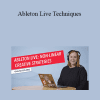
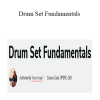
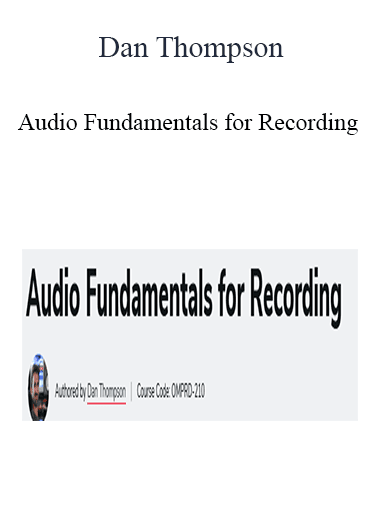
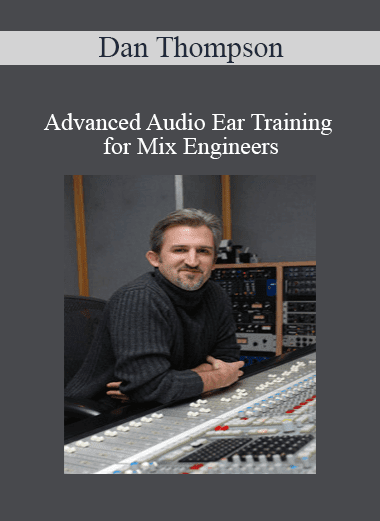
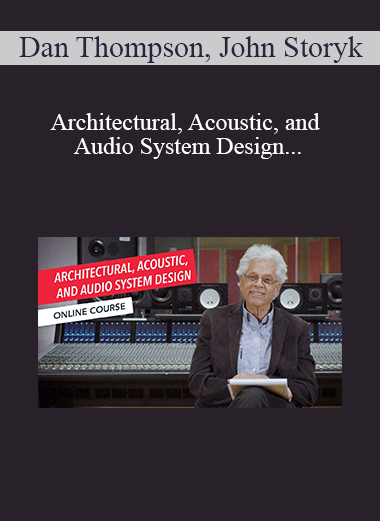
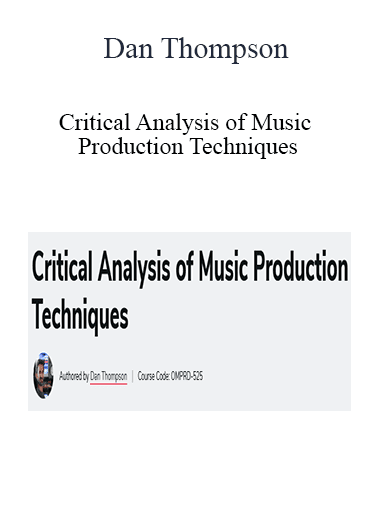
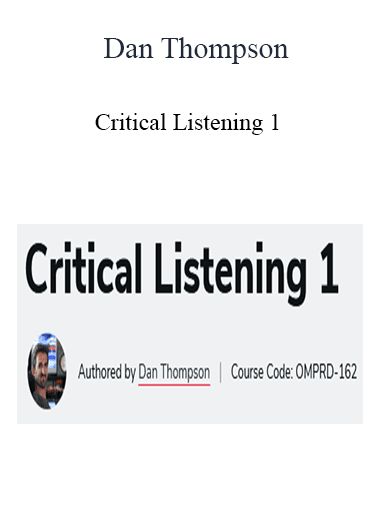
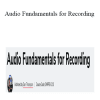
5 reviews for Dan Thompson – Audio Fundamentals for Recording
There are no reviews yet.